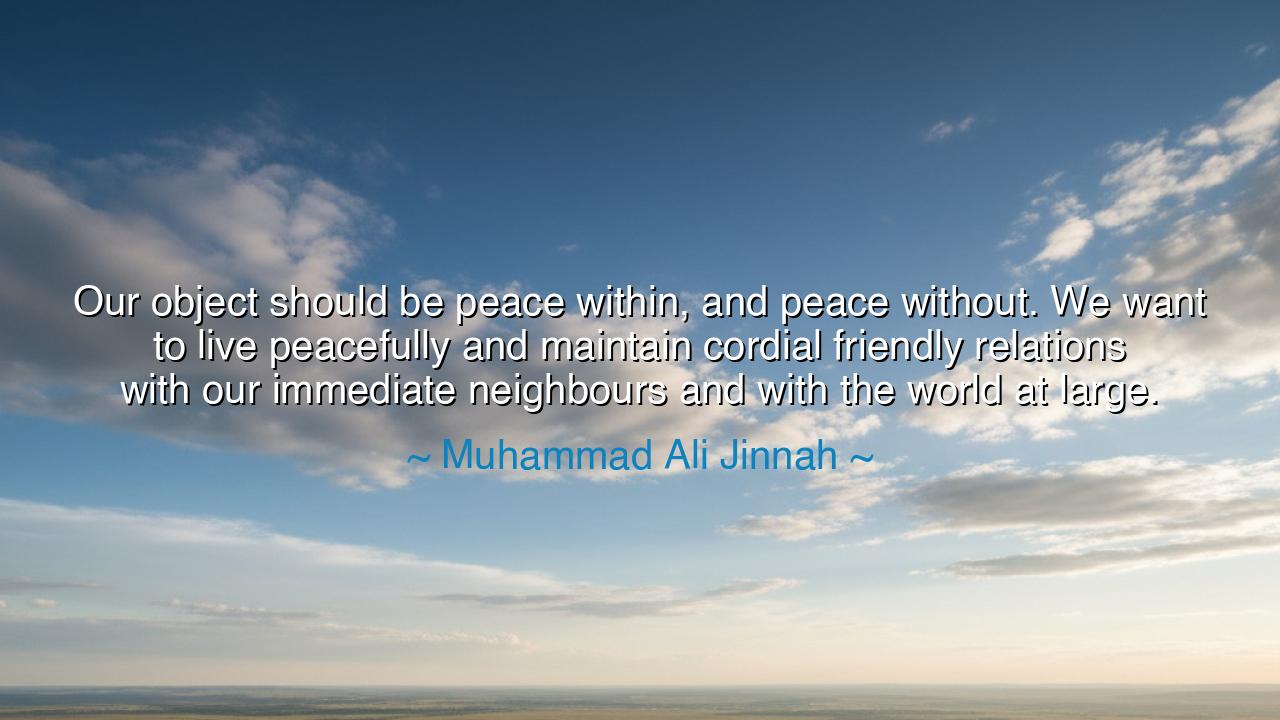
Our object should be peace within, and peace without. We want to
Our object should be peace within, and peace without. We want to live peacefully and maintain cordial friendly relations with our immediate neighbours and with the world at large.






Hear the words of Muhammad Ali Jinnah, founder of a nation and visionary of his people: “Our object should be peace within, and peace without. We want to live peacefully and maintain cordial friendly relations with our immediate neighbours and with the world at large.” These words, though spoken in the twentieth century, echo with the cadence of eternal wisdom. For no nation, no community, and no soul can endure in turmoil; strength is found in harmony, both inward and outward, both in the heart and upon the earth.
To have peace within is the first task. For what is a nation, if not a gathering of countless souls? And what is a soul without peace but a battlefield of confusion? Jinnah’s teaching reminds us that true stability begins with the stillness of the spirit. A man who wars with himself cannot lead others; a people divided within cannot rise as one. Thus, the first object of life and nation must be inward concord, where justice, fairness, and dignity rule the heart and home alike.
Yet peace without is its natural companion. Just as a man must find harmony within himself, so must nations seek harmony with their neighbors. Jinnah lived in a time of partition, when blood was spilled between communities, when distrust ruled across borders. Yet even in such times, he declared that the goal was not endless strife, but friendship—cordial relations with neighbors, and goodwill toward the world at large. His words reflect the ancient teaching: a house cannot prosper if it quarrels with those at its gate, and a nation cannot flourish if it breeds enmity with those across its borders.
History gives us examples of this truth. After the Second World War, Europe was torn apart, its nations broken by hatred and ruin. Yet out of the ashes arose a bold decision: to unite former enemies in bonds of cooperation. Germany and France, once locked in endless conflict, joined hands in peace, and from their trust grew the European Union, bringing decades of prosperity. This is Jinnah’s vision made manifest—peace within and peace without, for where there is reconciliation, there is growth, and where there is friendship, there is strength.
But the wisdom of these words extends beyond nations into the lives of individuals. A family cannot thrive if members quarrel among themselves, nor can a person flourish if they are torn between bitterness inside and hostility outside. To cultivate peace within—through forgiveness, through self-reflection, through inner discipline—is to prepare the ground for harmony with others. And to extend peace without—through kindness, respect, and diplomacy—is to ensure that this inner calm is never lost in the storms of conflict.
The lesson, then, is twofold: seek peace in your heart, and build peace with those around you. Guard against hatred, whether it rises in your thoughts or in your borders. Resist the temptation to feed division, for it is a fire that consumes both self and neighbor. Instead, sow patience, sow understanding, sow the seeds of friendship wherever possible. As Jinnah taught, peace is not weakness, but the strongest foundation upon which a people or a person may stand.
So, children of tomorrow, carry these words as a banner before you: peace within, peace without. Begin with your own soul; let it be free from envy, rage, and fear. Extend that peace to your family, to your community, to your nation, and to the world. For only when the inward and outward are joined in harmony shall we see true prosperity. This is the vision of Muhammad Ali Jinnah, and it is a call across generations: to live not in conflict, but in dignity, friendship, and peace.






AAdministratorAdministrator
Welcome, honored guests. Please leave a comment, we will respond soon